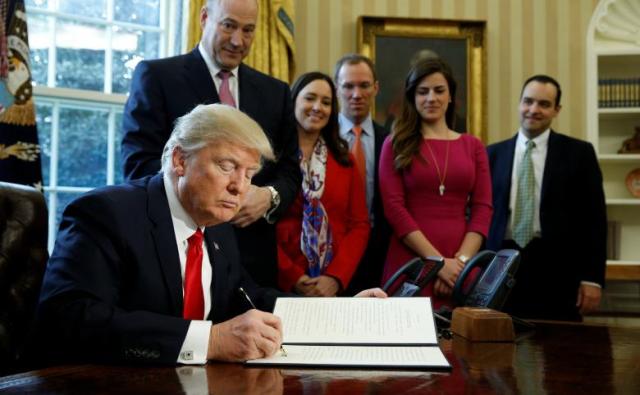
With a swipe of his pen, U.S. President Donald Trump on Friday started killing off a retirement advice rule that wealth managers from Wall Street to Wisconsin have spent the last six years lobbying against.
A landmark policy from the Obama era, the so-called fiduciary rule requires brokers and financial advisers to act in the best interest of retirement savers. This restricts their ability to earn commissions and to sell some higher-fee products.
Wall Street has argued it would harm consumers because it would raise compliance costs and therefore fees, and force them to get rid of Main Street clients and small businesses that offer 401(k) plans.
Trump’s executive order asks the Labor Department to review whether the rule needs to be changed or dumped.
Both supporters and opponents are girding to argue their case. But the industry has the edge, with Trump officials stating they were planning on rolling back regulation generally and criticizing the fiduciary rule in particular.
The Chamber of Commerce, one of a number of trade groups which have filed lawsuits to kill the rule, cheered Trump’s order.
“We look forward to swift action from the Department of Labor in putting this delay into effect and reevaluating matters of policy and law,” the Chamber said in a statement.
Shares of banks with large wealth management divisions jumped on Friday with Bank of America (BAC.N) up 2.5 percent, Morgan Stanley (MS.N) 5.5 percent stronger and Wells Fargo (WFC.N) over 2 percent higher.
Insurers, whose sales of annuity products were at risk from the rule, also rose, with shares of Prudential (PRU.N) up 1.9 percent and Metlife (MET.N) 1 percent stronger.
"Everyone will be pleased that DOL’s rush to get it done before the administration change is set back," said Judi Carsrud, director of government relations for the National Association of Insurance Financial Advisors (NAIFA), which has been fighting the rule for years.
NAIFA plans to pursue a "very straightforward" fix such as a “legislative approach” that directs retirement account advisers to act in clients’ best interest – a standard that Carsrud believes the group’s members already meet.
CHANGES ALREADY UNDERWAY
The Obama administration had said conflicted advice costs American families $17 billion a year but the industry has said that figure was inflated.
No-one disputes the high cost that firms would have to pay to comply with the new rule, an amount the Labor Department estimates at as much as $31 billion over the next decade.
Banks have already started changing things with Bank of America saying this week it would more clearly disclose the fees it charges clients of its Merrill Lynch wealth management business.
Bank of America Corp had already started cutting back on "transactional" accounts that charge clients a commission for every trade, rather than a flat fee based on assets.
Morgan Stanley (MS.N) has decided to keep such accounts but is making changes that will allow advisers to work within the rule's confines by creating new contracts, re-training advisors and updating supervisory software.
Swiss bank UBS UBSN.VX welcomed Trump's order and said it supported the creation of a fiduciary rule under the Securities and Exchange Commission, which could apply to all advisers not just retirement advisers.
Wells Fargo said it would continue to work with regulators to ensure higher standards of care for investment clients. Other banks either declined to comment or were not immediately available to comment.
Implementing changes was particularly tough for small-time financial advisers.
Along with two colleagues, Juli McNeely, who runs McNeely Financial Services in Spencer, Wisconsin has spent between 45 and 60 hours each week since December preparing for the rule.
Their work has focused largely on figuring out which clients from their rural community should now pay a flat fee for financial advice, instead of commissions, and creating new templates for paperwork.
“Now we have a little breathing room to make sure we do this right and not quickly to meet a deadline,” said McNeely, who voted for Trump, in part because of his pro-business stance.
AN HONEST PROCESS
One person who has yet to comment on the retirement rule review is the person who will be at the center of it -- Trump's choice to head the Labor Department, Andy Puzder.
Puzder, chief executive of fastfood group CKE Restaurants, has been a vocal opponent of what he has called "overregulation" during the Obama administration. The 401(k) plans he offers his own employees are less generous than some rivals, suggesting a more industry-friendly approach.
While the Labor Secretary cannot unilaterally repeal a rule, his agency can rewrite and change a rule substantially or scrap it.
William Galvin, the top securities regulator in Massachusetts, described Trump's order as "reckless".
"My office will continue to protect small investors when those in Washington cave to big business."
Not all proponents of the rule were as pessimistic.
“There’s no question that in the minds of industry lobbyist, delay is just a step toward repeal,” said Barbara Roper, investor protection director for the Consumer Federation of America (CFA). “If the Department of Labor follows an honest process and considers the impact on retirement savers, we have a winning argument."


